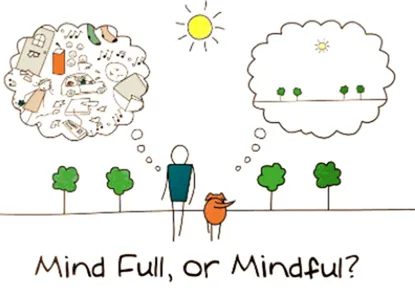With our brains processing over 6,000 thoughts everyday, it’s easy to be overwhelmed by life.
The month of May is dedicated to mindfulness and mental health awareness. We took a look into what mindfulness is, and it is not all about meditation or sitting on cushions with your eyes shut – though this may be one tool which is useful to some.
Elizabeth Franklin, Administration Officer, Connect4U Australia looks at this very real issue.

Mindfulness is...
- Being aware - of your thoughts, your surroundings
- Being kind - to yourself and others
- Being purposeful, paying attention
- Listening to understand, not just to respond
- Not reacting automatically or being judgemental
- Letting go of the past and not worrying about the future, just focus on the present
- Paying attention to what is around you and inside you
This is different to the notions that mindfulness is all about relaxation, positive thinking and suppressing feelings. It is about acknowledging situations and circumstances but not getting carried away by them.
The benefits of mindfulness...
Practicing mindfulness benefits our overall health and wellbeing with research confirming it helps, us physically, mentally, and emotionally.
Just a few of the practical benefits are:
- Improved wellbeing and stress relief through managing responses and attitudes to stressful situations
- Assists in managing stress, anxiety, depression, and anger management
- Can be useful management of chronic pain and musculoskeletal conditions. It may not cure the conditions but can be helpful as part of a management plan
- Better sleep - able to fall asleep better and get better quality of sleep
- Is a useful method in managing weightloss through mindful eating
- Happier in life from enjoying the moment
- Improved focus and able to work on achieving goals
Some useful mindfulness tools...
It is evident that this is a useful tool in everyone’s daily life. Some suggested methods for mindfulness are:
- Being present - with people or when doing a task. Focus on what you are doing.
- Put your phone down
- Take note of emotions and body senses
- Breath - take deep, long breathes.
- Stop rushing! Just be...
- Take a walk, enjoy nature
Lastly, use apps designed to help guide you with mindfulness. Some good ones include Smiling Minds, Headspace, Calm, and Stop, Breathe & Think.
What other mindfulness methods do our team use?
We asked our support coordinators what some of their go-to methods are for being mindful. Some suggestions included tapping, massage, hydrotherapy, use of music and relaxation tracks, swimming, walking, mindfulness apps and Pilates.
There are many trained professionals that can assist us in successfully practicing mindfulness and using it for the benefit of our health and wellbeing. Key benefits for NDIS participants are better emotion regulation, reduced anxiety, enhanced social skills and the ability to interact with others.
Our support coordinators can assist participants in connecting with appropriate therapists who can work with them to develop techniques to practice mindfulness in a way that helps them achieve their plan goals. Through learning mindfulness, participants have improved confidence levels and develop the ability to participate in community and social activities.
Some useful links...
Further useful information about mindfulness...
Need a Support Coordinator? Give Connect4U Australia a call on 1800 595 423!

